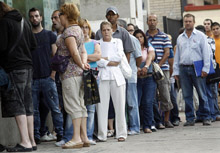
Typical street scene in Santa Ana, El Salvador. (Photo: iStock)
IMF Survey: Industrial Countries 'Need to Adjust to New Reality'
October 10, 2010
- Post-crisis global policies falling short, El-Erian says
- Industrial countries face unusually high risks
- More global coordination, longer view needed
Industrial countries did a good job of managing the global financial crisis but their post-crisis adjustment requires a course correction, a leading investment manager and economic analyst said.

Jobs line in Madrid, Spain: industrial countries risk slipping into lost decade of low growth, high unemployment, reduced welfare (photo: Susana Vera/Reuters)
PER JACOBSSON LECTURE
Industrial countries’ economic policies must acknowledge the structural changes in their economies that the crisis wrought. Otherwise the global economy will suffer, warned Mohamed El-Erian, chief executive of PIMCO, the world’s largest bond investor, in an October 10 lecture sponsored by the Per Jacobsson Foundation at the 2010 IMF–World Bank Annual Meetings.
He told the audience that industrial countries were on a “bumpy journey to a new normal.” A major national and global realignment means there will be no return to business as usual.
The “sudden stop” suffered by the international monetary system two years ago is still being felt by millions of people around the world. Industrial countries were especially hard hit, El-Erian noted; they now face low growth, high unemployment, and welfare losses together with sagging social safety nets.
Strong response to crisis
The global economic crisis was the result of many years of balance sheet excesses and payments imbalances combined with overconsumption of innovative financial products that lowered the barriers to investment, including in the housing market, El-Erian said.
National authorities acted boldly to address cascading failures and did so in a globally orchestrated fashion, averting a multiyear economic depression and suffering by billions around the world. El-Erian described the international reaction to the crisis as “global coordination at its best.”
Bumpy road; new destination
But industrial countries, having “won the war,” now risk “losing the peace,” El-Erian warned, as the policy convergence formed in the midst of the crisis gives way to fragmentation and excessive political brinksmanship. “A once-promising global response has been replaced by inadequately coordinated national economic policies and growing frictions among countries.”
The world faces a protracted and complex recovery process, El-Erian noted. The challenges are the result of massive structural imbalances—illustrated by excessive consumption, asset bubbles, inadequate risk management, and misunderstood financial products—combined with balance sheet destruction.

El-Erian: “A once-promising global response has been replaced by inadequately coordinated national economic policies and growing frictions” (IMF photo)
The result so far has been dampened economic growth in industrial countries, persistently high unemployment that is becoming structural in nature, large public sector deficits and debt, and increased influence by politics on economics. Growth and wealth are migrating to the emerging markets.
Industrial countries face three serious challenges, El-Erian observed.
• Balance sheets. The industrial countries confront serious balance sheet challenges and are unlikely to be able to grow out of their debt. Despite all that the official sector—including the European Union and the IMF—has done to prevent debt overhangs, new investors are not coming in and existing investors are leaving, taking advantage of public sector assistance to do so.
• Structural changes. Unemployment, changes in company and household spending and investment behavior, and sluggish private sector investment are all changing the landscape of industrial country economies. Most worrying of all is the fact that high unemployment is becoming structural. Skills are being eroded and social safety nets and government budgets are being strained. And those who do have jobs are spending and investing cautiously.
• Wall Street vs. Main Street. Financial recovery has been more successful than economic recovery, El-Erian observed. Wall Street benefited from the recapitalization of the banking system and low interest rates. But there has been limited spillover of Wall Street’s normalization to the real economy, accentuating the divide between Main Street and Wall Street, small companies and large, poor households and rich, old generations and young. The lack of a windfall tax on the artificial surge in financial earnings meant institutions could pass their extra revenues on to their executives in the form of compensation and bonuses. El-Erian described the post-crisis world as one of “privatization of massive gains and socialization of enormous losses.”
Expectations are changing, noted El-Erian. While denizens of industrial countries are confronted with the fact that future generations may struggle to attain the standards of living they have enjoyed, residents of the systemically important emerging economies increasingly project better lives for their children and grandchildren, he said. The lack of confidence in the future means that self insurance—by both companies and households—against future risks is increasing, a practice that was previously limited mostly to developing countries.
Critical juncture
The global economy is at a critical juncture, said El-Erian. Having averted a crisis-induced depression, industrial countries are losing the momentum of the recovery and they risk slipping into a lost decade of low growth, high unemployment, and reduced welfare. This would not only harm global growth directly, but also put at risk the successful development of key emerging economies.
El-Erian called on “credible and well functioning” multilateral institutions like the IMF to play a larger role in informing and influencing the design and implementation of globally consistent and reinforcing national policies. The IMF, he said, is uniquely placed to be the trusted advisor, put together the pieces of the new normal, and derive action plans that can be discussed, implemented, and monitored.
But the institution continues to fall short on facilitating the required level of coordination of policies and hardwiring a meaningful peer review process that is viewed as credible, fair, and effective. “The IMF is still not where it needs to be,” he noted.
History books will report with admiration on the crisis management phase, predicted El-Erian, but they will be less generous about the post-crisis response unless industrial countries and the multilateral institutions add adaptability and agility to their repertoire.
In response to a question from the audience on how long the new normal will last, El-Erian warned the current recovery is not necessarily stable. PIMCO estimates a 55 percent probability of the current status lasting 3–5 years—meaning the global economy faces, to quote U.S. Federal Reserve Chairman Ben Bernanke, an “unusually uncertain outlook.”
Breakout phase
Asked how the new normal extends to emerging markets, El-Erian noted that the new status quo is much improved in many nonindustrial countries, with accelerated migration of growth dynamics to emerging markets and a number of developing countries entering the hoped-for development breakout phase. The new normal is a decoupled world, but if the global economy tips into a double dip, decoupling will not be as strong and, similarly, unexpected success would also lead to recoupling.
El-Erian noted in responding to another question that supersecular factors such as aging populations in industrial countries and climate change could affect the equilibrium of the new normal on the downside, while a number of scientific discoveries have the potential to dramatically improve productivity and thus have a positive impact.


